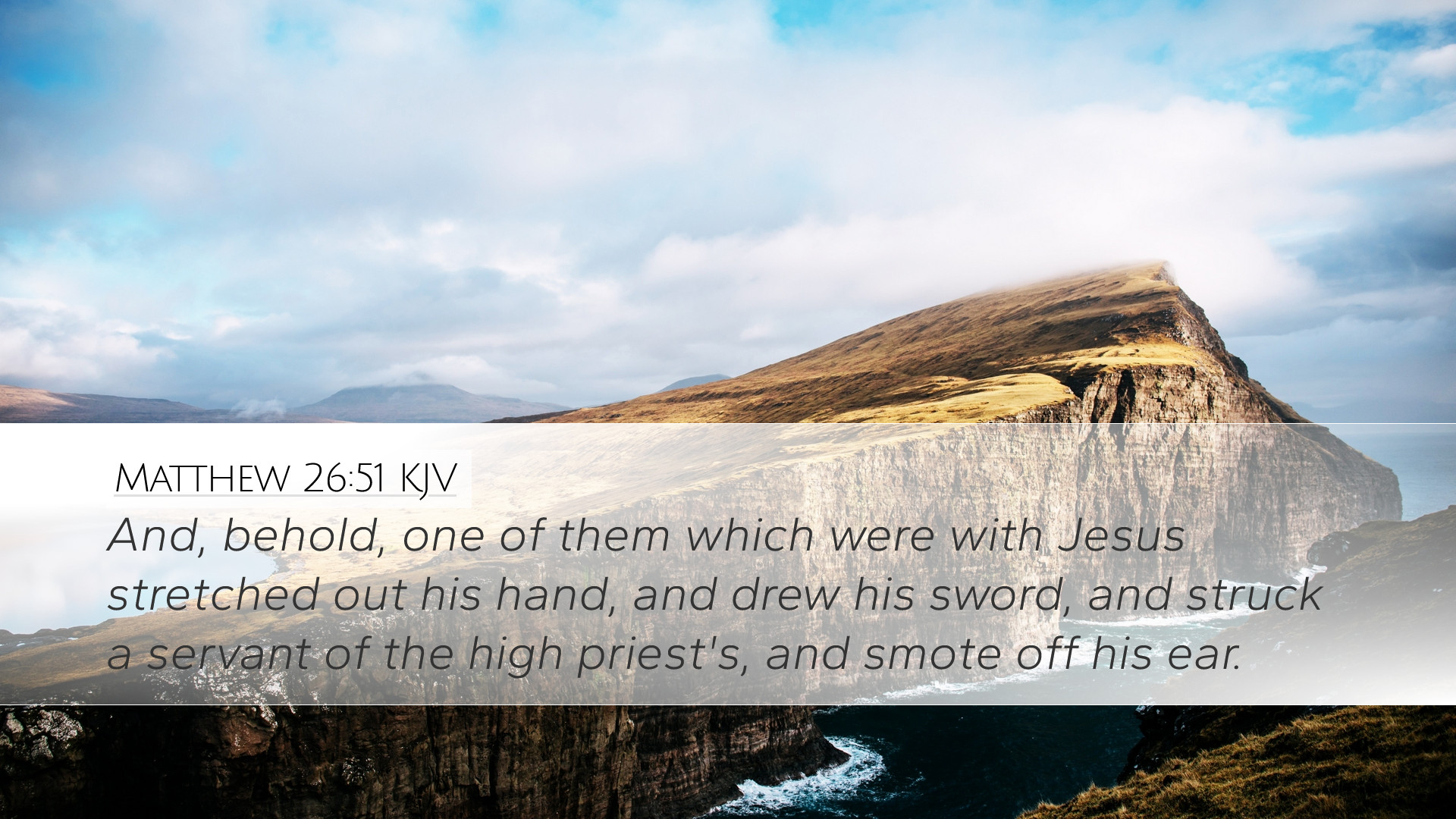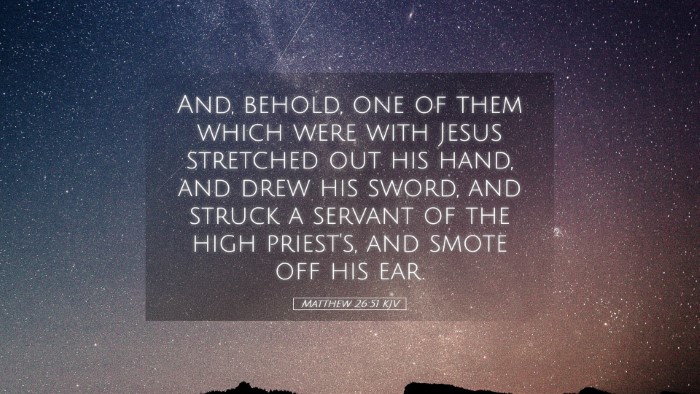Commentary on Matthew 26:51
Verse Context: In this passage, we find ourselves at a crucial moment in the narrative of the Gospels. The events are unfolding in the Garden of Gethsemane, where Jesus is about to be arrested. Matthew 26:51 states:
"And, behold, one of them which were with Jesus stretched out his hand, and drew his sword, and struck a servant of the high priest's, and smote off his ear."
Introduction
This verse captures a significant and often overlooked moment in the Passion narrative, highlighting themes of impulsiveness, the nature of true discipleship, and the fulfillment of prophetic scripture.
Analysis of Key Elements
Peter's Impulsive Action
Matthew Henry's Insights: Matthew Henry emphasizes that Peter’s action was driven by impulse and was a miscalculation of the situation. Instead of heeding Jesus’ earlier instructions to pray and be vigilant, Peter relied on his own strength to defend Jesus. This illustrates a common human tendency to act first and think later.
Albert Barnes' Commentary: Barnes points out that Peter's attempt to defend Jesus with violence was misguided. It was a moment showing the contrast between human judgment and divine purpose. Jesus had already predicted His suffering and the need for His sacrifice; thus, Peter’s resistance was ultimately counterproductive.
The Servant of the High Priest
Adam Clarke's Observations: Adam Clarke notes the character of the servant struck by Peter, named Malchus according to John 18:10. Clarke highlights that this act was not only an attempt to protect Jesus but also a misdirected application of Zeal. Even the servant of those who came to arrest Jesus becomes a figure in this narrative, symbolizing the broader conflict between earthly power and divine purpose.
The Symbolism of the Sword
Matthew Henry's Reflections: Henry discusses the symbolism of the sword, which in biblical terminology often represents both the word of God (Ephesians 6:17) and carnal warfare. In this moment, Peter's sword represents a reliance on physical violence rather than spiritually navigating the events that God had ordained.
Theological Implications
True Discipleship
This act of violence is rich with implications for understanding the nature of true discipleship. Disciples are called not to resort to human means to achieve God’s ends. Hence, there is a clear delineation between the ways of the Kingdom and the ways of the world.
- Self-Sacrifice: A true disciple is called to bear their cross and follow Jesus, which often entails suffering rather than fighting.
- Spiritual Warfare: Paul reminds us that our struggle is not against flesh and blood but against spiritual forces (Ephesians 6:12).
Fulfillment of Prophecy
The events leading to the arrest of Jesus fulfill numerous scriptural prophecies regarding the suffering Messiah. The resistance of Peter, as noted by Barnes and Clarke, indirectly affirms the necessity of Christ’s suffering and the denial of His violent defense.
Lessons for Today
As contemporary readers and believers, Matthew 26:51 serves as a reminder of the pitfalls of reliance on human wisdom and strength. Pastors and theologians can extract several key lessons:
- The Danger of Impulsiveness: Many believers may be tempted to react and take matters into their own hands instead of seeking God’s will through prayer.
- The Nature of Christ’s Mission: Understanding that Jesus came to fulfill the Law and the Prophets, not to create an earthly revolt.
- The Power of Non-Violence: Emulating Christ's response to aggression teaches the importance of non-violent resistance and love for enemies.
Conclusion
Matthew 26:51 is not merely a historical account but a rich source of theological reflection. It invites us to ponder how we, as individuals and communities of faith, respond to challenges and crises in our lives. Are we prepared to submit to God's will, or do we instinctively grasp for weapons of the flesh? In understanding this moment in Jesus’ journey, we are challenged to embrace a deeper, more profound faith that mirrors that of our Savior.


